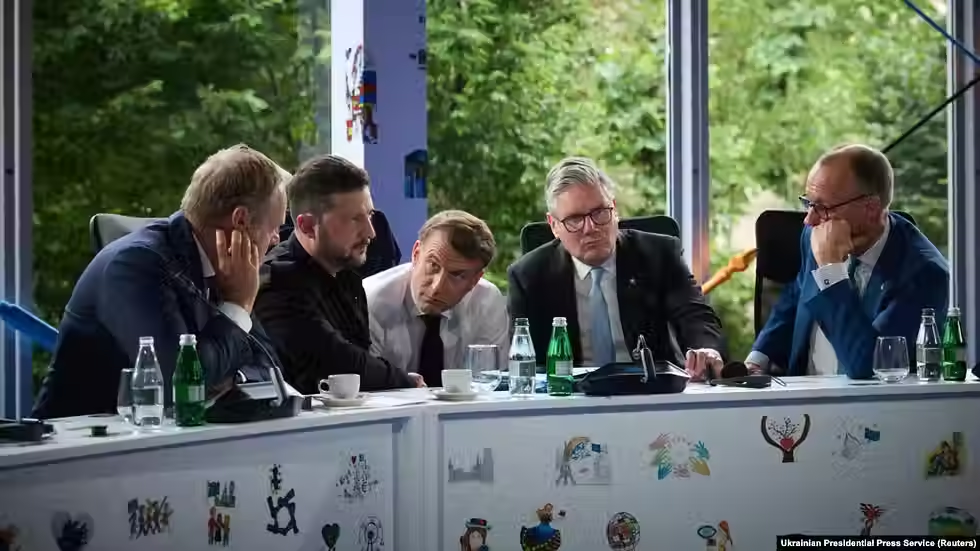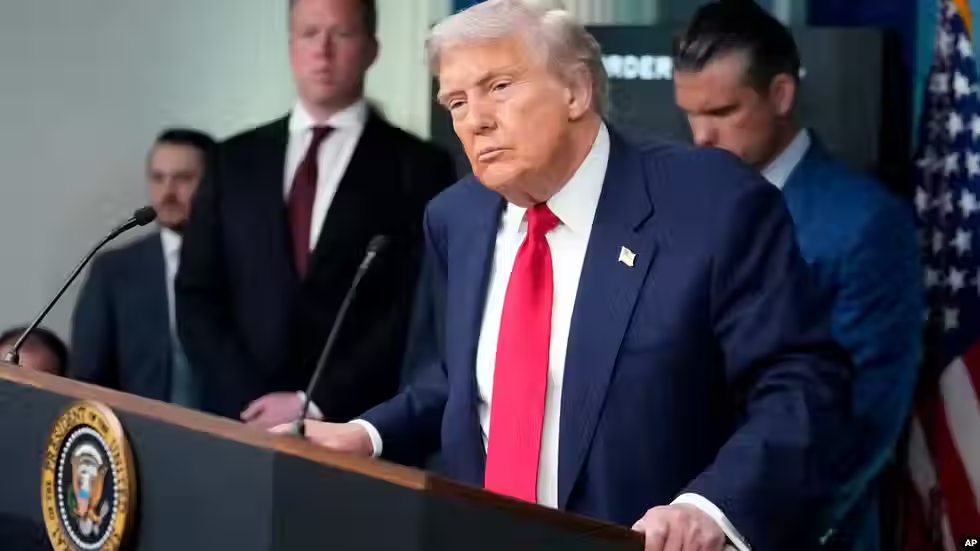Geopolitical Tensions Escalate: Summits, Sabotage, and Shifting Alliances
- Obyektiv Media
- Aug 13, 2025
- 6 min read

As global powers brace for an anticipated summit between US President Donald Trump and Russian President Vladimir Putin, the international landscape is marked by heightened geopolitical tensions, escalating military buildups, and concerning human rights developments.
High-Stakes Diplomacy: Trump-Putin Summit on Ukraine
The highly anticipated meeting between US President Donald Trump and Russian President Vladimir Putin is scheduled for 15 August in Anchorage, Alaska, the largest city in the state. President Trump has stated that the primary objective of his meeting with Putin is to end the conflict in Ukraine. He hopes to eventually bring both Ukrainian and Russian leaders to the negotiating table, suggesting that he might participate in such a trilateral meeting if necessary.
Trump has described the upcoming meeting as "test-oriented" and acknowledged that it could yield either positive or negative outcomes. He has also not ruled out the possibility of a "territorial exchange" as part of a peace deal, stating that an agreement must be mutually beneficial to both sides. Ukraine's President Volodymyr Zelensky, however, firmly declared that Ukraine would not recognise any decisions regarding Ukraine made without its participation at the US-Russia summit. He stressed that discussing Ukraine without Ukraine is impossible, and no one would accept such decisions.
Reports from Bloomberg suggest that a potential peace agreement could involve Russia halting offensive operations in Zaporizhzhia and Kherson regions in exchange for Ukraine withdrawing its forces from Donetsk and Luhansk regions. The US is reportedly attempting to secure consent from Kyiv and its European allies for this plan, though its acceptance by Ukraine and Europe remains uncertain.
European nations are expressing anxiety over the summit, fearing a "trap" by the US and struggling to secure a place at the negotiating table despite their staunch support for Ukraine and preparations for further sanctions against Russia. European officials stress the need for an immediate ceasefire and security guarantees for Kyiv, alongside a monitoring mechanism. They maintain that they will not legally recognise any Ukrainian territories occupied by Russia as Russian, drawing a parallel to their non-recognition of Crimea's annexation in 2014.
Relations between Russia and Azerbaijan are experiencing significant strain, exacerbated by events linked to the conflict in Ukraine. Azerbaijani MP and political analyst Rasim Musabeyov stated that Russia is taking "hostile and unacceptable" actions against SOCAR (Azerbaijan State Oil Company) facilities in Ukraine. He warned that if Moscow continues these actions, Baku might lift its embargo on arms supplies to Ukraine.
These developments follow reports of Russian "Shahed" drone attacks on a SOCAR oil depot in Ukraine's Odesa region on 8 August, which caused a fire and damaged a diesel fuel pipeline. Two days prior, Russian forces also struck a Ukrainian gas compressor station that was receiving trial deliveries of Azerbaijani gas. Kyiv condemned these attacks as "deliberate actions against energy and relations with Azerbaijani, US, and European partners". Ukrainian President Volodymyr Zelensky and Azerbaijani President Ilham Aliyev discussed these attacks, confirming their targeted nature.
Some pro-government Telegram channels in Azerbaijan have suggested that Baku may begin producing 122 mm and 155 mm artillery shells for Ukraine if Russia continues its attacks on Azerbaijani energy assets in Ukraine. Russia's Ministry of Foreign Affairs (MFA) Deputy Director Aleksey Fadeyev warned that lifting the embargo would not help resolve the conflict and would worsen the situation "on the ground," asserting that Azerbaijan's partners are well aware of Russia's stance on arms supplies to the "neo-Nazi regime in Kyiv".
The tension between Baku and Moscow has been intensifying for several months, stemming from incidents such as the AZAL passenger plane crash in December 2024, the deaths of two Azerbaijani brothers during an operation in Yekaterinburg, and the arrests of around 20 Russian citizens in Baku, including employees of "Sputnik Azerbaijan". Russia's State Duma Deputy Konstantin Zatulin commented that Azerbaijan has recently pursued an independent policy that could be perceived as hostile to Russian interests. Russian propagandist Vladimir Solovyov even speculated about the necessity of a "special military operation" against Azerbaijan to prevent a NATO base in the Caspian Sea, while another Russian lawmaker, Andrey Gurulyov, proposed banning Azerbaijani imports and increasing pressure on Azerbaijanis in Russia.
Despite the friction, Azerbaijan continues to provide humanitarian aid to Ukraine, including generators, transformers, and cables, to help restore its energy system damaged by Russian attacks.
European Rearmament and Internal Challenges
In response to Russia's full-scale invasion of Ukraine, European military-industrial complex enterprises have tripled their expansion rate. A study of over 150 military-industrial facilities belonging to 37 companies revealed that their total area has increased by 7 million square meters. In spring 2024, construction areas reached 3.02 square kilometres, compared to 0.79 square kilometres in 2021. Major projects include a joint venture between Germany's "Rheinmetall" and Hungary's state defence holding, focusing on producing 30 mm ammunition for KF41 Lynx infantry fighting vehicles, with plans to expand to Leopard and Panther2 tanks. The European Union is funding 88 of these facilities through a €500 million programme. The Financial Times highlights this as a shift from peacetime production towards building a more sustainable industrial base for conducting war.
Meanwhile, Ukraine faces a critical shortage of infantry troops, a crisis as severe as the ammunition deficit. Experts report that front lines stretching 5-10 kilometres might be defended by as few as 12 fighters. This manpower disparity allows Russia to employ "total infiltration" tactics, with small infantry groups penetrating Ukrainian lines, as seen near Pokrovsk in Donetsk region. While Ukraine mobilised approximately 700,000 soldiers in 2022, Russia's conscription campaigns have shifted the balance in its favour. As of 2025, Russia has over 1.13 million active military personnel, with about 640,000 deployed in Ukraine. Despite officially having over 1 million troops, Ukraine reportedly has just over 300,000 deployed at the front line. Ukraine needs to recruit about 300,000 more soldiers to replenish its brigades, some of which are operating at only 30% strength. The rate of recruitment, 17,000-24,000 per month, is insufficient given the scale of desertions and losses.
Since February 2022, when Russia's invasion of Ukraine began, at least 65 people have been killed during Federal Security Service (FSB) arrest operations in Russia, with an additional four killed in occupied Zaporizhzhia region and one self-detonation in Samara. "IStories" compiled these figures from official Russian sources and pro-law enforcement media. Of those killed, 44 were Russian citizens, and nine were identified as Central Asian nationals without specified citizenship. Kazakhstan, Ukraine, and Belarus citizens were also among the deceased. The FSB suspected 28 of those killed of links to Ukrainian intelligence or planning attacks under the direction of Ukrainian armed forces volunteer units, while 27 were suspected of ties to ISIS. Most of these deaths occurred in the North Caucasus, with 12 in Dagestan and Ingushetia, and nine in Kabardino-Balkaria. "IStories" noted that the actual number of deaths could be higher, as their count is based solely on publicly available information from security services.
Russia's policies towards migrants have also significantly tightened, particularly after the "Crocus City" concert hall terrorist attack in March 2024, for which Tajik citizens were blamed. Saint Petersburg Governor Alexander Beglov banned migrants from working as couriers, citing aims to combat shadow employment, improve service quality, and create jobs for Russian citizens, especially youth and students. This follows similar bans on migrants working as taxi drivers and in rented private cars in July. By early 2025, 47 Russian regions had banned migrants from taxi and public transport, 39 from trade, 27 from education, and 19 from medicine. Russia has also expanded the list of reasons for revoking migrant citizenship and regularly conducts police raids in migrant dormitories, where detained individuals report being forced to fight in Ukraine.
Another alarming development is Russia's publication of a database of Ukrainian orphaned children "available for adoption" in the occupied Luhansk region. This database includes profiles of 294 children under 17, complete with names, photos, and personal descriptions, which "Save Ukraine" director Mikola Kuleba likened to a "slave catalogue". Many of these children were born before the Russian occupation of Luhansk and hold Ukrainian citizenship; some lost parents due to Russian attacks, while others were given Russian documents to legitimise their forced displacement.
The US State Department has reportedly softened its human rights report concerning Russia, Israel, and El Salvador. The new report on Russia is notably shorter and milder in tone compared to previous versions, with specific omissions regarding the persecution of the LGBT community, despite a Russian Supreme Court ban on the "international public LGBT movement" and nationwide raids against its members.
The complex interplay of diplomatic efforts, military aggression, and internal political dynamics underscores a volatile global environment, with the outcomes of current negotiations and conflicts yet to be determined.



Comments